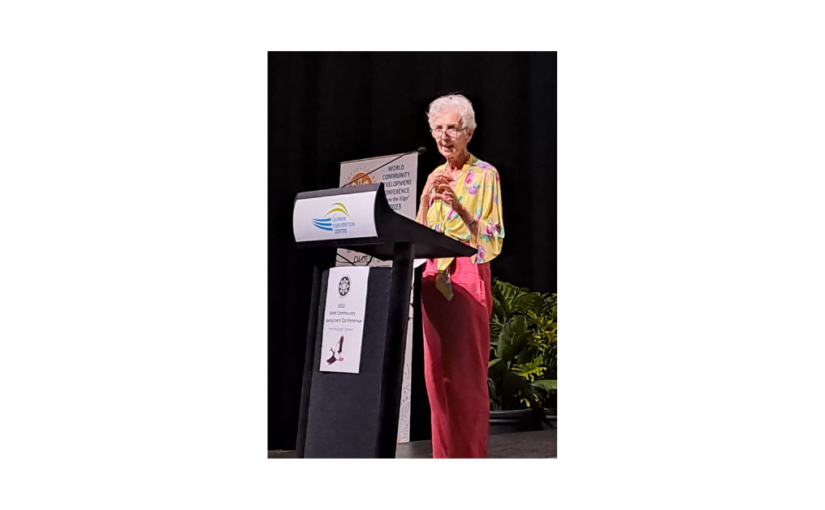| During the WCDC 2023 in Darwin, Anastasia Crickley was presented with the IACD Lifetime Achievement Award, in recognition of her enduring commitment to human rights and social justice, her longstanding contribution to community work in Ireland and internationally and to IACD. At this year’s AGM in July, Anastasia stepped down as an IACD Trustee after 9 years on the Board. She took the opportunity to share key points drawing on her experience, reiterating belief in and commitment to IACD and community development globally and a call to action around key issues for practitioners in the coming years. ‘The existence of IACD is really important, a fundamentally important expression of a discipline as is clearly articulated in the definition and values IACD has put together. It takes what we all do beyond just a few methods or an approach that is applied in other areas, and makes what we do core and central in a way that calls for the global acknowledgment that a global discipline with a global organisation deserves. May I make three points: – We have to very much rely on the efforts of all of us here today and others who cannot be with us to become and continue to be mechanisms for earning authority for Community Development. Our authority as people who are practitioners, academics or people associated with the discipline has to be earned. We can assert our roles and responsibilities but we are mistaken if we confuse these with authority. Authority and respect need to be earned, in our case not only from work done but also from how we go about doing it and whose interests it serves. – Asserting independence of Community Work or Development is extremely important, and in particular, while working in and with states, Community Development needs to be independent. Some feel we shouldn’t take money from the state and with regard to some states they have a very valid point. I am of the view however that most states have opposition political parties and don’t have any problem with them getting some resources. All of us involved in community work and community development should be in a position to hold a mirror up to the states we come from, even though doing that in a particular context can demand all of the skills and strategies that we can apply. By doing so we are in effect strengthening the democracy our countries assert and aspire to and curating conditions for real participation by all including when we are using state resources for that purpose. – Throwing off the shackles of colonial Anglo-American male beginnings of our discipline and using the reinterpretation of it, and the evolving methods and ideas which are diverse globally are I think, really important. This decolonisation is something we need to learn to do from the ground up in association with all the voices from all over the world, including the voices of those we met recently in Darwin. Finally, I am conscious that some of this can sound a bit pious and that virtue signaling is getting us nowhere. We community workers and associates have done a lot of virtue signalling about the SDGs but as we approach the UN General Assembly midway summit in September it’s clear that there’s much to be done to get beyond the mantra of consultation to real participation at every level – from the local to the global. With regard to the SDG’s and so many other initiatives and issues, we need to keep going, building and asserting the collective rights of communities and in particular of marginalised and minority communities and Indigenous Peoples globally – and their rights to have a real say about decisions affecting them. As climate justice creeps further from view with disastrous consequences not just for all alive now but for the generations whose futures we’re squandering, this calls for action now and the courage always demanded of Community Workers to go the road less traveled wherever it takes us. I look forward to walking with you.‘ |

